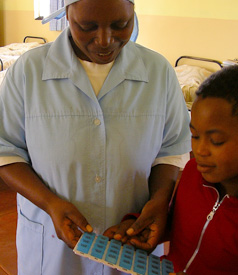Support justice-driven, accurate and transparent news — make a quick donation to Truthout today!
Mbabane – Sibongile Mavimbela has been living with HIV for the past 12 years; she has been on antiretrovirals for the past seven. But the mother of two fears the supply of free ARVs could dry up in the near future if contributions to the Global Fund on HIV/AIDS, TB and Malaria fall short of the $20 billion needed to meet development targets.
The mother of two is one of the 2.5 million people in 144 countries who have received anti-retroviral therapy thanks to the Global Fund over its eight-year existence. But the Fund’s future is uncertain, as governments and private sector donors will meet in New York on October 4 and 5 to announce their contributions 2011 to 2013.
The Fund says it needs a minimum of $13 billion – a level of funding that would only cover programmes already begun, with future rounds of support capped. To support existing programmes as well as new ones that would enable the achievement of Millennium Development Goal targets will require an estimated $20 billion.
Germany, the third largest contributor to the Fund after the U.S. and France, plans to cut its aid budget by two thirds. Italy is likely to stop contributing to the fund entirely that has made it possible for millions of people living with HIV to access ARVs for free.
“Other countries have announced modest increases,” said Aymeric Peguillan, head of the Swaizland mission of medical charity Médécins Sans Frontières (MSF). “In the past, recipient countries were asked to reduce their budget proposals by 10 percent.”
He fears that countries will be told to cut back spending as early as this year.
Click here to get Truthout stories like this one sent straight to your inbox, 365 days a year.
The Kingdom of Swaziland has the highest HIV/AIDS prevalence in the world – 26 percent of the country’s 1.1 million people are living with HIV/AIDS. According to MSF, 14,000 new TB cases are diagnosed every year – and up to 80 percent of these people also have HIV. Life expectancy has fallen to less than 32 and two-thirds of the population lives below the poverty line.
Swaziland’s application for $140 million of support from Round 10 of the Global Fund is the largest the country has ever applied for.
Mavimbela and other AIDS activists delivered a petition to the U.S. and European Union embassies to urge rich countries to commit themselves to replenish the Global Fund with the needed $20 billion needed over the next three years.
“We are also demanding that the Swazi government joins hands with other governments from developing countries during the Third Voluntary Replenishment Pledging Conference [in New York],” said Mavimbela.
Swazi activists, led by MSF, Swaziland Positive Living, Swaziland National Network of People Living with HIV/AIDS, Women Together and International Community of Women Living with HIV/AIDS, demand that rich countries honour their 2005 pledge to contribute 0.7 percent of their gross domestic product to development assistance.
While EU head of delegation in Swaziland Hans Duynhouwer said he shared the activists’ concerns, he also noted that Southern African countries – including Swaziland – have failed to fully exploit grants they’ve received.
“I wish Southern African countries could expeditiously use the grants allocated by the Global Fund so that more funds could be available,” said Duynhouwer.
Siphiwe Hlophe, director of Swaziland Positive Living (SWAPOL), agreed that the disbursement of funds from the principal recipient, National Emergency Response Council on HIV/AIDS (NERCHA), is very slow. She said NGOs working in the field of AIDS and TB prevention, treatment and care were short of resources to reach people affected, while money was sitting with NERCHA.
“We [SWAPOL] received funding in June for funding that we were supposed to get in January,” said Hlophe.
Even as the country prepared its application for Round 10, about $33 million from previous allocations remained unspent.
NERCHA, Hlophe says, is the sole conduit for Global Fund aid to Swaziland. NGOs have proposed that the Coordinating Assembly of Non-Governmental Organisations (CANGO) become a second recipient of this aid.
Derrick von Wissel, the director of NERCHA, acknowledged that there are unspent funds but he said this was because some projects are slower than others.
“In Round Two we used 97 percent of the grant, that was completely absorbed in 2008. But some projects – such as building soup kitchens for orphans and vulnerable children and hiring health personnel – take time.”
He said some of the money is also allocated towards strengthening the health system which also takes time.
“There are NGOs which claim they can use the money for the different HIV/AIDS projects, but it’s one thing doing it by mouth and another implementing on the ground,” said von Wissel.
He supports the call for CANGO to become a second recipient of the Global Fund, but warned that the organisation should ensure that it has adequate personnel and facilities to meet the standards of the fund.
“This is a difficult job,” said von Wissel.
He remains hopeful though that Swaziland will receive the proposed grant despite the changed global financial situation.
“We need to continue putting pressure on rich countries which are now using the global crunch as an excuse to cut contributions to the fund,” said Peguillan.
The lives of Mavimbela and millions of other people living with AIDS are in the balance.
![]()
Visit IPS news for fresh perspectives on development and globalization.
Media that fights fascism
Truthout is funded almost entirely by readers — that’s why we can speak truth to power and cut against the mainstream narrative. But independent journalists at Truthout face mounting political repression under Trump.
We rely on your support to survive McCarthyist censorship. Please make a tax-deductible one-time or monthly donation.
